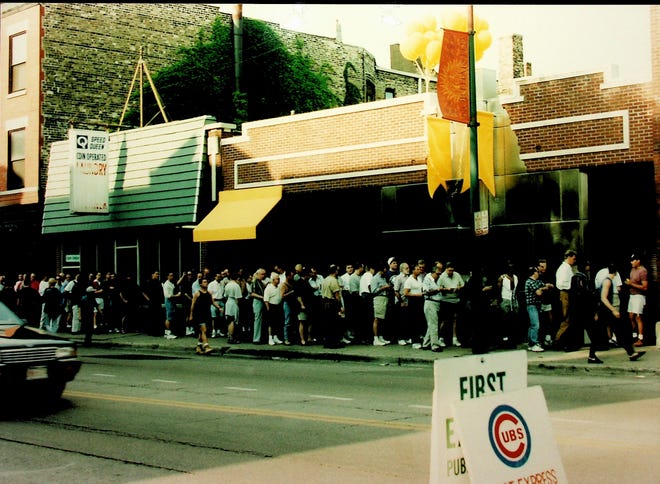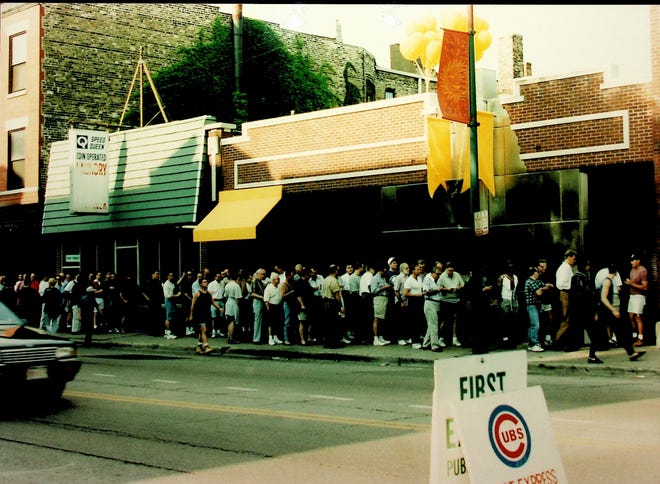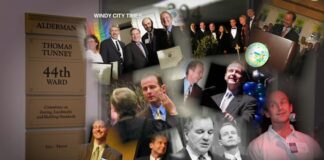- When it opened in 1982, it was an 800-square-foot dive bar with no windows and no signage.
- For gay men in Chicago and across the Midwest, however, it was a refuge.
- Sidetrack has been front and center as a fundraiser, donor and organizer for LGBTQ rights.
With 15,000 square feet spanning two stories and more than eight storefronts, Sidetrack is believed to be the largest gay bar in the Midwest. Located on the North Side of Chicago on Halsted St., it’s seen at least eight major expansions in half as many decades, which is why locals affectionately call it “the bar that ate Halsted.”
But Sidetrack wasn’t always so big. When it opened in 1982, it was an 800-square-foot dive bar with no windows and no signage, save for a sheet of plywood on which owners Arthur “Art” Johnston and José “Pepe” Peña had spray-painted the word “Soon.” That was its only placard – along with a gay slur, which some hospitable neighbor had graffitied on the front door as a welcome gift in lieu of the customary baked goods.
Back then, Chicago’s Boystown neighborhood – which recently changed its name to “Northalsted” – was a rough-and-tumble area blighted by gangs and crime. For gay men in Chicago and across the Midwest, however, it was a refuge in which to seek safety and shelter from the confines of the closet. Almost immediately, Sidetrack became its epicenter.
The history behind Pride Month:How the LGBTQ celebration came to be
Why do so many Gen Zers identify as LGBTQ:Because of the sacrifices of prior generations, experts say

“The first night we opened, we ran out of beer by 10 o’clock in the evening,” recalls Peña, who says Sidetrack remained busy each and every night thereafter. Not because it offered spirits. But rather, because it offered solidarity.
“Throughout our history as queer people, bars were often the only spaces where we were allowed to be free. And in those spaces, we created community,” says Kevin Hausworth, a longtime friend of Johnston and Peña. “We found each other, and in finding each other we started developing power. That power is what allowed us to go out in the world and take on really big challenges.”
Challenges like marriage equality, which Johnston championed as co-founder of Equality Illinois, the Prairie State’s oldest and largest LGBTQ advocacy organization.
In that way, Sidetrack became not only a social center, but also a political powerhouse, according to Hausworth, executive producer of Art and Pep, a documentary about Johnston and Peña that’s set to premiere this year – the bar’s 40th birthday. Co-created with director and producer Mercedes Kane, it’s the story of a thriving business, of the diverse community it nurtured, of the civil rights movement it joined and of the loving couple whose 49-year relationship is as much an institution as the business it birthed.
‘People didn’t know how to behave’
Now 78, Johnston and Peña met in 1973 at the age of 29. Johnston, a high school theater teacher who relocated from Buffalo, New York, by way of Virginia, had moved to Evanston, Illinois, in 1972 to attend graduate school at Northwestern University. Fearing crime in the city, he spent an entire year in the suburbs without stepping foot in Chicago. Then, one night, his peers invited him to some bars downtown. Peña, a Cuban immigrant who moved to Chicago from Miami, was a bartender at one of them.
“I fell head-over-heels, crazy in love. Like, instantaneously. But he had a partner, who coincidentally was also named Arthur,” Johnston says. “So I went back to his bar twice a week just to have a beer and go home. Then, one night, he said to me, ‘By the way, I broke up with Arthur today.’ I let some time go by, then asked, ‘What are you doing after work tonight?’ He came home with me that night and never left. Literally. So we’ve basically had a 49-year first date.”
‘Rednecks 4 Rainbows’:Surge in small-town Pride events helps LGBTQ folks find home
‘We have to be on guard a lot’:Why safety comes first for so many LGBTQ travelers
For nearly a decade, Johnston taught while Peña tended bar. Then, a dear friend came to them with a novel idea: He wanted to open the Midwest’s first gay “video bar,” and he wanted Peña to run it for him.
Music videos were just beginning to arrive on the scene – MTV debuted in 1981 – so Peña had to create many of the videos himself by aggregating interesting visuals from films and setting them to popular music.
“At first, people didn’t know how to behave,” recalls Peña, who says patrons didn’t know if they were supposed to be silent, like watching movies at a movie theater, or social, like watching TV at home with a partner. “So for the first few months we were open it was like a zombie bar … People just sat silently and stared at the screen.”

Still, the concept caught on quickly. So much so that many other bars tried to replicate it. Although most of them failed, Sidetrack endured.
Johnston credits Peña, who decades later still serves as Sidetrack’s resident VJ.
“He was the best bartender,” Johnston says. “He was cute and funny and sweet, and he knew everybody.”
He also was smart: To drum up business, he had the idea to host regular theme nights – like “Musical Monday Show Tunes,” which Sidetrack still hosts every Monday, which is often the “weekend” for workers in the theater and foodservice industries.
“It became a big deal,” Peña says. “I can’t think of any city today where gay bars don’t do show tunes on Monday or Tuesday, but we were the first.”
Serving equality
Johnston and Peña found their political voices in 1977. As part of her “Save Our Children” crusade, anti-gay activist Anita Bryant had waged a successful campaign to overturn a Dade County, Florida, ordinance prohibiting discrimination based on sexual orientation. When she visited Chicago a week later, she was greeted by 5,000 members of the LGBTQ community who had turned out to protest – including Johnston and Peña, who were so inspired that they subsequently joined efforts to secure passage of the Chicago Human Rights Ordinance, a landmark law protecting lesbians, gay men and bisexuals from discrimination in housing, employment and public accommodation.
Pride 2022:LGBTQ definitions every ally should know for Pride Month (and all year long)
‘Stand in’ support:How one TikTok video started a movement to help LGBTQ couples on their wedding day
“Because Chicago is a Catholic city, people thought we’d never be able to pass a basic gay rights ordinance here. But we did,” says Johnston, who lobbied for the bill alongside other LGBTQ business owners. “And when we passed that law in the City of Chicago in 1988, it changed everything. It wasn’t long thereafter that the same law firms that used to fire gay employees started seeking gay employees. It was a great and amazing change.”
Fresh off their victory, Johnston and other local activists in 1991established Equality Illinois, which for 31 years has led efforts to elect pro-LGBTQ lawmakers and pass pro-LGBTQ laws. Among its greatest victories, for example, was lobbying for the Religious Freedom and Marriage Fairness Act, which in 2013 made Illinois the 16th state to legalize marriage equality.

During that and other milestones, Sidetrack has been front and center as a fundraiser, donor and organizer.
“I would have a hard time finding anything important in the history of our community that didn’t begin in a bar,” Johnston says. “Of course, when we opened no elected official – no one running for office – would be caught dead near a gay bar. Now we literally have to schedule candidates so they don’t bump into each other. There was a month recently, for example, where the governor was here twice and the mayor was here four times. That’s remarkable to me.”
Love and longevity
Sidetrack’s success has been tremendous, but not easy. In its earliest days, for instance, gay bars had to pay off mobsters and police officers to avoid being raided by law enforcement. At the same time, landlords regularly forced gay businesses out of their buildings. Then came the AIDS epidemic, which victimized an entire generation of customers and employees. At one point – when the friend and business partner with whom they’d opened Sidetrack unexpectedly died, leaving ownership of the bar to his mother – Johnston and Peña even came close to losing the business.
The bar’s most recent challenge, of course, was COVID-19, which closed Sidetrack for three months and put Johnston himself in the hospital.
Best and worst states for LGBTQ folks?:Divide worsens after ‘Don’t Say Gay,’ report says
Somehow, someway, Sidetrack has survived it all.
If you ask Johnston and Peña, they’ll attribute their longevity to good fortune. But if you ask Kane, who filmed Art and Pep during the pandemic, the secret to their success is actually love.
“Their love for each other was the spark for all of the work that they’ve done,” Kane says. “It’s the foundation for Sidetrack, and why Sidetrack feels like such a safe, welcoming space to everyone who goes there. It’s a seed that has grown and expanded outward into the community, bringing people together to make change possible for the LGBTQ community.”
The seed is still growing. Johnston and Peña’s current project, for example, is the development of a gay cannabis brand. And eventually, they’d like to open a hotel nearby on Halsted Street. As “gayborhoods” in other cities dissolve – an unintended consequence of LGBTQ progress and acceptance – they’re determined to keep Chicago’s alive.
“We absolutely believe that assimilation has been a great thing, but there are still times when you need to be around people whom you perceive to be your clan,” Johnston says. “We have the most vibrant gay district in the country. And for that reason, I know – I don’t just believe, I know – that the best place in the entire United States to be gay or lesbian is Chicago.”








